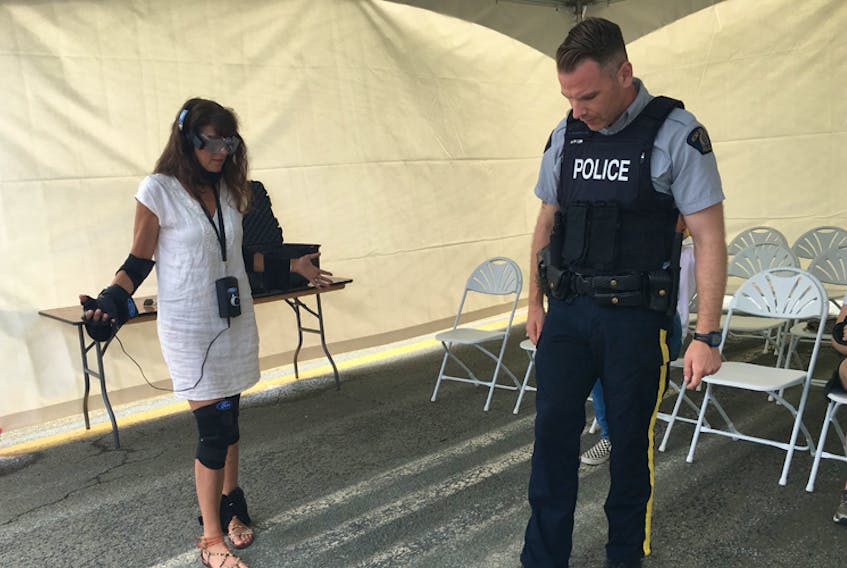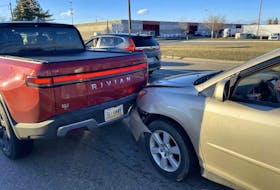I should not be driving in this condition.
My eyes are practically crossed, I can barely focus on the instrument panel in front of me let alone the road ahead. I feel nauseated. I think I’ve just run over a traffic cone. It feels like I’ve had a few too many alcoholic beverages.
So what the heck am I doing behind the wheel of a 2018 Ford Fusion with a carload of passengers?
It’s a good thing I’m not on a public road. I’m on a closed controlled course.
The crossed eyes, queasiness and impaired vision is not due to alcohol or other drugs but to a pair of special goggles that the instructor handed me to put on for my second time through the curvy course marked by cones.
The goggles simulate the feeling of being drunk behind the wheel. They do a good job. I’m fully aware I shouldn’t be driving though because I haven’t actually been drinking. Someone who has been drinking is impaired both physically — they can’t see properly, their reaction time is delayed — and cognitively — they think they are OK to drive.
The closed course along with the goggles are part of Ford Motor Company’s Driving Skills for Life program. For its first-ever Nova Scotia stop at CFB Shearwater last month, I was invited to check out the award-winning initiative.

The Driving Skills for Life program, now in its 15th year, allows young drivers to experience advanced hands-on driver training and education in a safe, simulated and carefully controlled environment.
Driving is distracting at the best of times, especially for new drivers. For young people, the statistics are grim.
According to Parachute Canada, a national, charitable organization that focuses on preventing injury and saving lives and a partner in Ford’s Driving Skills for Life program, motor vehicle collisions are the leading cause of death for young Canadians between 15 and 19 years of age. The majority of traumatic injuries to teens aged 15-19 are due to car crashes.
Education and experience go a long way to making new drivers aware of the dangers of inexperience behind the wheel and distracted or impaired driving.
According to statistics, four key areas, hazard recognition, vehicle handling, speed management and space management, are critical factors in more than 60 per cent of vehicle crashes. Distracted and impaired driving is an over-arching theme which affect all four areas.
The day I attended Driving Skills for Life at CFB Shearwater, about 100 newly-licensed kids took part and were subjected to the nauseating goggles and the road courses. Parents were encouraged to participate, too.
Also on hand for the event were law enforcement officers from the Halifax Regional Police and the R.C.M.P. I loved this aspect of the program because it offered new drivers an open, inviting forum in which to ask law enforcement officers questions about what happens when you drive drunk, impaired or distracted and what the consequences are when you get caught.
Besides driving the course with the goggles, which simulate impaired driving, I also drove a closed course while being distracted on purpose, as in, my passengers yelled at me, the radio blasted music and the instructor encouraged me to send texts while driving to remind my husband to pick up milk on his way home.
A few crunched cones, a wrong turn and a missed stop sign later, I slammed on the brakes in the middle of the lane because I couldn’t concentrate on my driving. No wonder.
Then I got to try Ford’s simulated impairment Drugged Driving Suit.
The innovative suit, developed with scientists from Meyer-Hentschel Institute — a German company that specializes in mobility impairment research — simulates the physical impact of impairment on driving.
The suit consists of goggles which mimic distorted or tunnel vision, ear muffs to deaden sound, wrist and ankle weights to add weight and reduce balance like an impaired driver would experience.
Sufficiently disoriented, I was instructed by an officer to take nine heel-to-toe steps in a straight line — I could barely see my feet in front of me — turn around and take another nine steps.
With restraint devices on my elbows, neck and knees to limit mobility, it was difficult to lift my legs or even look down at the line.
The suit cannot mimic how alcohol affects the brain. A sober person recognizes the impairment, an impaired person does not realize the difficulty she or he is experiencing performing the simplest of tasks.
On the closed course, with distorted vision, a nauseated feeling and distraction from my passengers, I drove in a way I have never driven but it was completely controlled and not induced by alcohol or drugs.
The entire experience was powerful, eye-opening and an excellent demonstration of what it feels like to drive distracted or impaired.
Ford Motor Company’s Driving Skills for Life program should be a prerequisite for all drivers.









